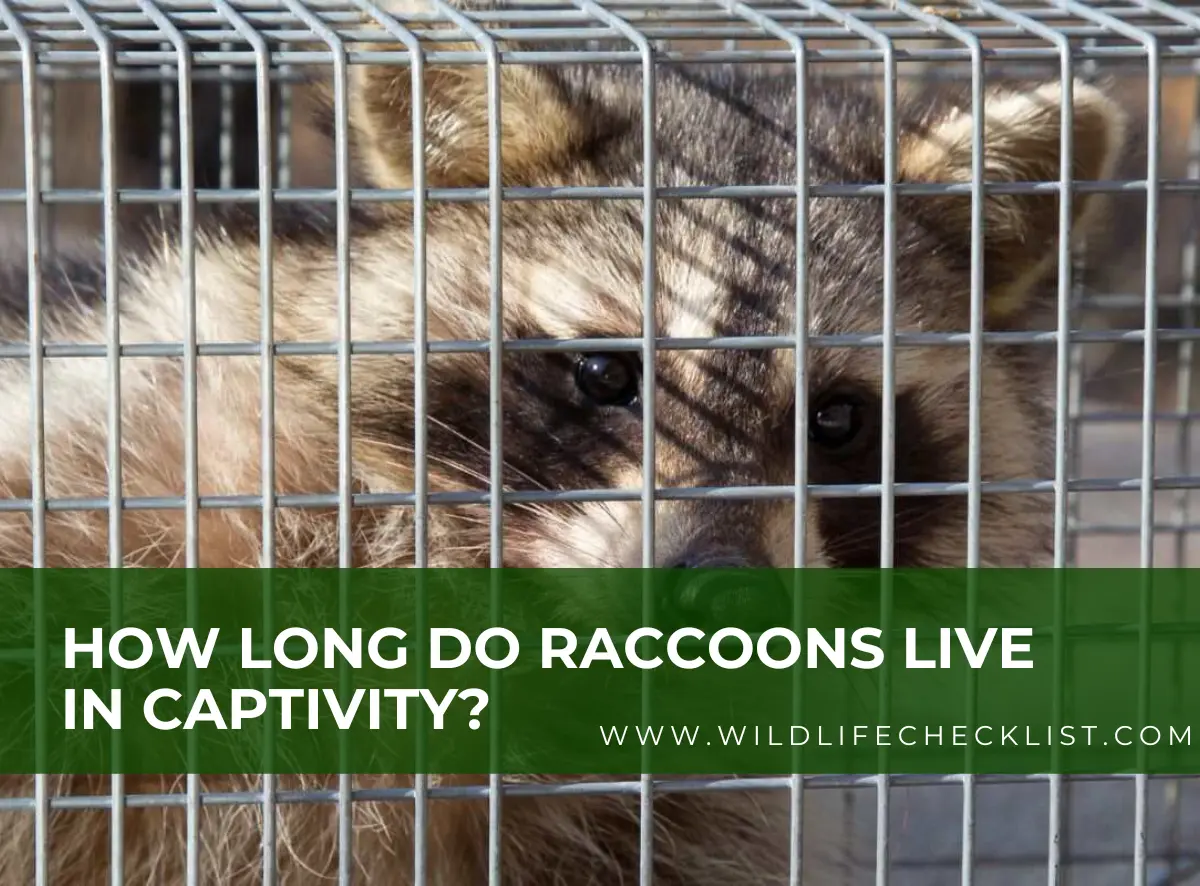How Long Do Raccoons Live In Captivity?

We know that raccoons can survive in almost any condition of the environment. As much as they are wild, some people still love to keep them in captivity as pets, which has much to say about their lifespan.
The lifespan of raccoons is considerably shorter than you might imagine. There are notable differences in the life span of raccoons in the wild compared to raccoons in captivity, as with most animals. Raccoons in captivity can live and enjoy a longer lifespan than the raccoons in the wild.
A raccoon can thrive for approximately ten years with ample nourishment and suitable shelter. Contrastingly, most wild raccoons have a lifespan of about 2 to 3 years, with many of their young offspring struggling to survive past their first year. However, raccoons in captivity can reach up to 20 years of age. It is important to emphasize that various factors influence the lifespan of raccoons.
Raccoons in captivity are shielded from natural predators and receive consistent nourishment and quality medical care. The listed factors and other factors make raccoons in captivity live longer than the ones in the wild.
Contents
Why do Raccoons Live so Long in Captivity?
Raccoons can live longer in captivity than in the wild due to several factors, and the factors are:
- Controlled Environment: Captive raccoons have access to consistent food, water, and shelter, reducing the risks of starvation and exposure.
- Reduced Predation and Hazards: In Captivity, raccoons are protected from natural predators, diseases, and accidents common in the wild.
- Medical Care: Captive raccoons often receive veterinary care, which can address health issues and prolong their lifespan.
- Reduced Stress: The absence of competition, territorial disputes, and the need to find food can reduce stress levels in Captivity.
As much as raccoons can live up to 2 to 3 years in the wild, the lifespan of a raccoon can extend up to 20 years or more when they live in captivity.
It is vital to note that keeping raccoons as pets or in captivity will require appropriate permits and adherence to animal welfare regulations.
Why do Raccoons Live so Short in the winter?
Raccoons are known to be covered furs, which makes people think they can spend unlimited time outdoors. But during winter, raccoons can die because the season has a grip on them; this is why they always look for ways to hunk down in dens to keep their energy and stay warm.
Raccoons can manage to search for food and water, but they are not always at their best activity during winter. Remember, they are not true hibernators; that is, they do not enter into a state of deep sleep or reduced metabolic activities like other animals. Raccoons enter into a state of inactivity (torpor), enabling their temperature to drop and slowing their metabolic activities.
Several factors cause a reduction in the lifespan of raccoons during winter, and they are:
- Limited Food Availability: During winter, raccoon food sources are always scarce. Some of their preferred food, like fruits, nuts, and insects, are more scarce and inaccessible during the winter. Raccoons will become malnourished and have weakened immune systems that open them to diseases and health conditions.
- Extreme Weather Conditions: A harsh winter can make them freeze and affect their temperature. Snows and ice can put their health in a terrible corner. Also, raccoons can find it challenging to get a good shelter for themselves, which makes them face the risks of hypothermia and frostbite.
- Increased Predation: Raccoons are opened to high levels of Predation during winter. This is because, in their search for food, they can get caught by predators like foxes, coyotes, and even birds, as they will take advantage of their weakened states.
Why do Raccoons Live so Short in the Wild?
The lifespan of a raccoon in the wild is about five years, but if they have access to abundant food and good shelter, they can live beyond five years.
But, some baby raccoons may die before reaching adulthood based on some factors, like disease, predators, human intervention, and starvation. These factors can shorten the lifespan of a raccoon in the wild. Human activities greatly threaten raccoons through hunting, Predation, trapping, and automobiles, contributing to a short lifespan.
Also, disease and starvation can reduce the lifespan of any raccoon. If they are far away from food sources, it will cause malnutrition and starvation. They are open to short lifespans if they are affected by disease and parasites. The more they compete for food, the closer they are to a short lifespan.
Raccoons can also be preyed upon by predators, which greatly threatens their lives and can limit their space for survival. In addition, environmental hazards can reduce their lifespan as well. Activities like natural disasters, harsh weather conditions, and habitat loss can affect raccoons.
Raccoons kept as pets or in captivity live longer and can live for about 15 to 20 years. Some of them can also live for more than 20 years compared to raccoons in the wild.
How Long Does a Raccoon Live as a Pet?
A raccoon can live as a pet for approximately 10 to 20 years. The long life of a raccoon living as a pet depends on different factors. These factors include good living conditions, diet, and access to proper medical care.
In captivity, raccoons tend to have a longer lifespan compared to their wild counterparts due to the absence of natural predators, consistent food availability, and adequate shelter. Giving raccoons proper care and attention is important to ensure they have good health and live long, even as pets.
The lifespan of a raccoon kept as a pet is influenced by various circumstances. The components include a secure environment protecting raccoons from predators, a nutritious diet, and frequent veterinary treatment to handle potential health issues. Additionally, pet raccoons benefit from the absence of the harsh conditions and hazards that their wild counterparts face daily.
Raccoons have complex care needs; therefore, keeping one as a pet needs to be carefully considered, as it is important to bear in mind. Raccoons can spread diseases to humans and other animals; thus, keeping them as pets may be prohibited in many locations.




